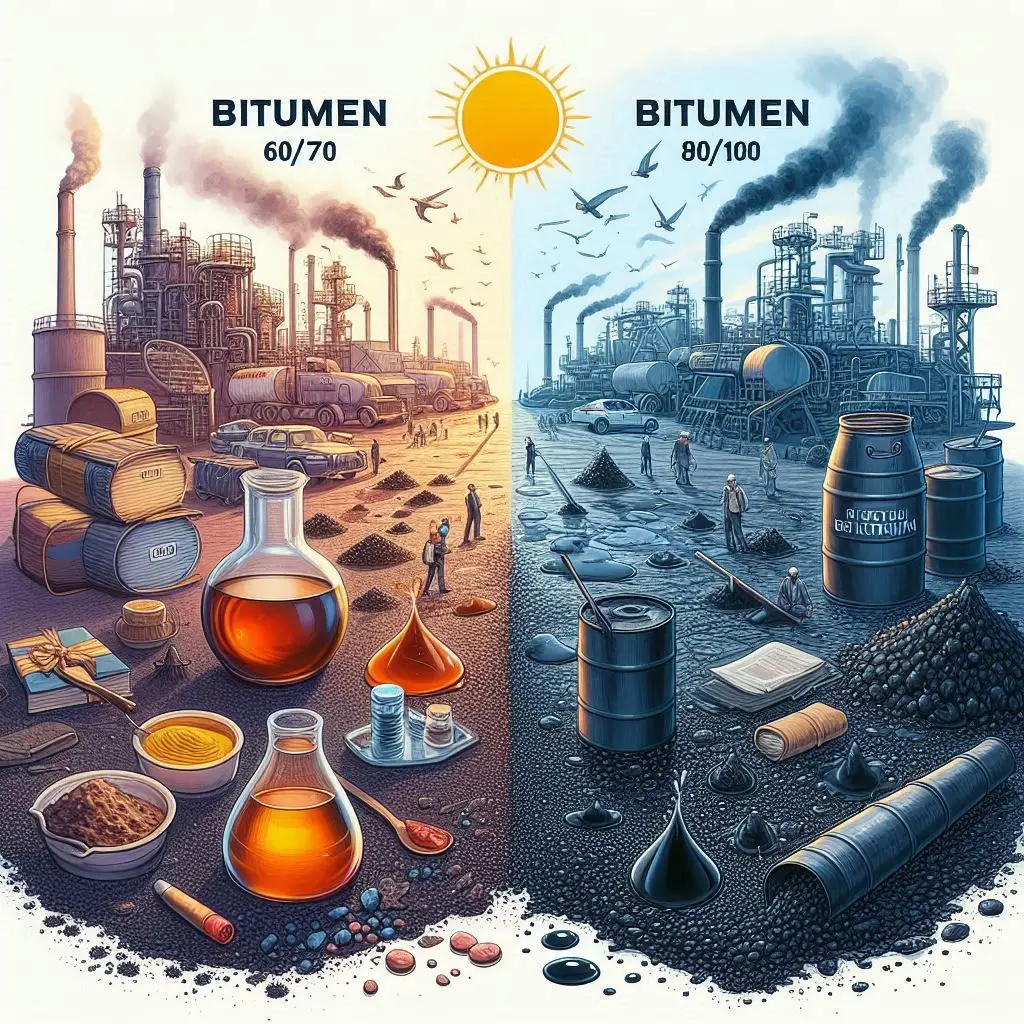
Difference Between Bitumen 60/70 and 80/100 – Complete Guide
Short Intro:
Bitumen 60/70 and 80/100 are two widely used grades in road construction and asphalt production. This guide explores their differences, applications, and performance characteristics.
Introduction
Bitumen is a crucial product in the petroleum industry, widely used in road construction, roofing, and waterproofing applications. Among the various grades available, Bitumen 60/70 and Bitumen 80/100 are the most common, each offering specific properties and applications. Understanding their differences can help engineers, contractors, and businesses make informed decisions about asphalt production, polymer modification, and long-term performance in different climates.
This article will provide a detailed comparison of Bitumen 60/70 and 80/100, including penetration grades, chemical characteristics, testing methods, applications, and cost-effectiveness. Additionally, we will highlight best practices for using each grade in road construction and related industries.
SEO Snippet
Bitumen 60/70 vs 80/100: Bitumen 60/70 has a penetration grade of 60–70 and is ideal for hot climates and polymer-modified applications, whereas Bitumen 80/100 is softer, with a penetration grade of 80–100, suitable for colder regions and flexible asphalt layers. Both are essential for road and infrastructure projects.
Difference Between Bitumen 60/70 and 80/100
Bitumen Overview
Bitumen, also called asphalt binder, is a dark, viscous substance obtained from crude oil through distillation processes. It is composed of complex hydrocarbons and does not undergo chemical changes during production, ensuring consistency and reliability. Unlike tar, which is derived from coal or wood and can release carcinogenic compounds at high temperatures, bitumen is safe for humans and the environment and has been approved across Europe for road construction.
Asphalt is a mixture of bitumen and mineral aggregates, typically containing 5–10% bitumen, fibers, fillers, and fine chippings to enhance strength and durability. Natural asphalt and bituminous mixtures occur in nature, but modern construction relies predominantly on refinery-produced bitumen for consistency.
Bitumen 60/70
Bitumen 60/70 is a refinery-grade bitumen with a penetration degree ranging from 60 to 70. It is produced using vacuum distillation in a controlled environment and is widely applied in road construction, insulation, and polymer-modified bitumen (PMB) production.
The penetration test determines the grade: a needle punctures a bitumen sample, and the depth reached in 5 seconds indicates hardness. Other tests for Bitumen 60/70 include:
- Ductility – flexibility and elongation capacity
- Softening Point – 49–56°C
- Flash Point – 250°C (ASTM D36)
- Viscosity and Heat Loss – performance under temperature
Bitumen 60/70 is cost-effective, durable, and preferred in countries like India and Southeast Africa. It also serves as a base for polymer-modified bitumen, improving elasticity, brittleness, and overall asphalt performance.
Bitumen 80/100
Bitumen 80/100 is classified as road-grade bitumen with a softer penetration of 80–100. It is primarily used in asphalt production for colder climates, where flexibility and thermoplastic properties are critical.
Unlike 60/70, Bitumen 80/100 is softer, allowing better performance at low temperatures, which prevents cracking in cold regions. It is suitable for:
- Hot asphalt mixture production
- Flexible road layers
- Applications where moderate hardness ensures longevity
This grade also undergoes rigorous testing, including penetration, softening point, and viscosity assessments to ensure quality.
Key Differences Between Bitumen 60/70 and 80/100
|
Feature |
Bitumen 60/70 |
Bitumen 80/100 |
|
Penetration Grade |
60–70 |
80–100 |
|
Hardness |
Harder |
Softer |
|
Best for Climate |
Hot / moderate |
Cold |
|
Main Uses |
Roads, PMB, insulation |
Asphalt, road coating, flexible layers |
|
Softening Point |
49–56°C |
Slightly lower, softer |
|
Flash Point |
250°C |
Similar, slightly lower |
|
Cost |
Affordable |
Slightly lower cost, softer |
In short, the primary distinction is penetration grade: 60/70 is harder and suited for hotter climates, while 80/100 is softer, ideal for cold regions. Both grades are crucial in road construction and asphalt engineering.
LSI Keywords
- Penetration grade bitumen
- Asphalt binder types
- Road construction bitumen
- Polymer-modified bitumen
- Bitumen softening point
- Bitumen flash point
- Hot and cold climate asphalt
- Bitumen 60/70 applications
- Bitumen 80/100 advantages
- Bitumen vs asphalt
External Links
- ASTM D36 Bitumen Standard – For testing bitumen flash point
- EN 12591 Bitumen Specifications – European bitumen standards
- Bitumen Uses in Road Construction
Conclusion
Bitumen 60/70 and 80/100 are both indispensable in the construction and asphalt industries. Choosing the correct grade depends on climate, application type, and performance requirements. Bitumen 60/70 offers durability and is suitable for hotter regions and polymer-modified applications, while Bitumen 80/100 ensures flexibility and longevity in cold climates. Understanding these differences helps engineers, contractors, and decision-makers optimize road construction, maintenance, and cost efficiency.
For more insights and industry updates, explore other reportages and articles on Novin Trades Reportage Section.
About Novin Trades
Novin Trades (www.novintrades.com | Telegram) is a leading supplier and information hub for petroleum and bitumen products. The platform provides comprehensive market analyses, in-depth reportage, and industry news to help businesses make informed decisions. Readers are encouraged to explore other sections of the website to stay updated on global oil and bitumen markets, pricing trends, and expert recommendations.

